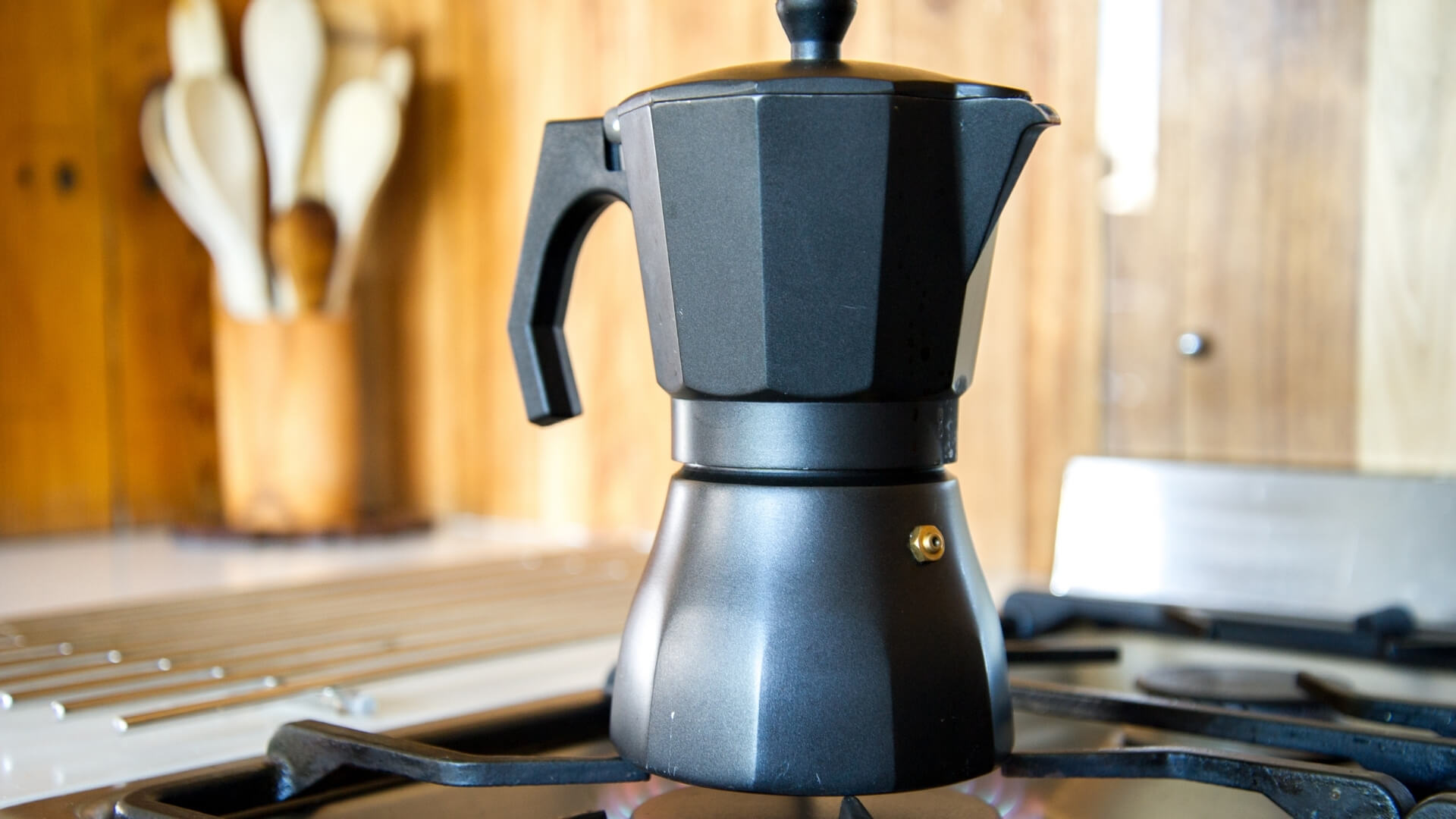In this article, I’m trying to answer all your questions about brown sugar in coffee.
There are two types of coffee lovers in the world – those who frown upon the idea of sugar in coffee and those who don’t.
Today, I won’t get into the debate of whether a sweetener belongs to coffee. That’s a debate for another day. This article is about the use of brown sugar in coffee.
The notion that brown sugar is healthier than white sugar is just plain wrong. News flash: both brown sugar and white sugar are nutritionally identical. Yes! You got it right. It’s just a myth that brown sugar healthier than white.
However, they certainly don’t taste the same. Brown sugar taste is different because it contains molasses that gives it a very pronounced caramel-y, toffee-like flavor. White sugar or refined sugar is just sweet. But brown sugar is both sweet and deeply flavorful.
Still not sure whether to switch to brown sugar for your caffeinated beverages? I’ll help. Below I have done my best to answer some of the most common queries related to brown sugar in coffee.
Let’s get to it then:
- Is Brown Sugar Better Than White Sugar?
- Does Brown Sugar Taste Good in Coffee?
- What Are the Benefits of Brown Sugar in Coffee?
- Is Brown Sugar Healthy In Coffee?
- What Are the Different Types of Brown Sugar?
- Brown or Raw Sugar?- Which One Is Better for Coffee?
- What Type of Sugar Is Best for Coffee?
- What Happens If You Add Coffee and Sugar Together?
- Alternatives to Sugar for Your Coffee (How to Sweeten Coffee without Sugar)
- Bonus: Great recipe for Starbucks Brown Sugar Oat Milk Shaken Espresso
- Let’s wrap this up
Is Brown Sugar Better Than White Sugar?
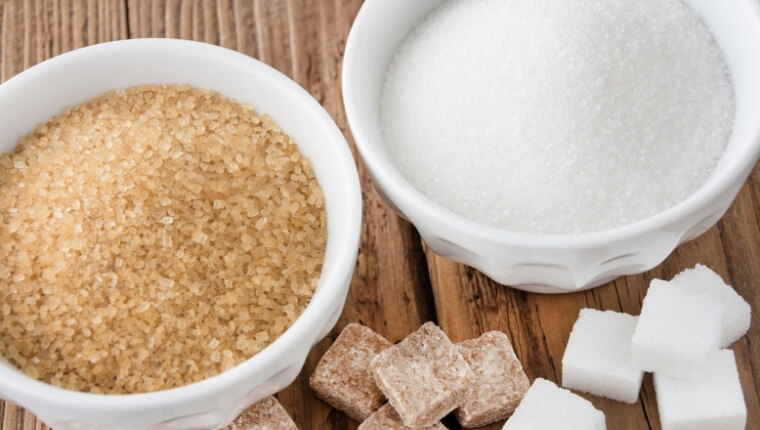
Well, not really. One teaspoon of white sugar contains 16 calories [source]. One teaspoon of brown sugar is loaded with 11 calories [source]. So, the margin of difference is negligible (but brown sugar still has less 😉 ).
Brown sugar contains a slightly higher amount of minerals due to the addition of molasses. But apart from that, both sugars have similar nutritional value.
So if you are thinking replacing brown sugar with white sugar in your coffee will reduce your daily calorie intake, sorry to disappoint you. But I’m glad you’re trying.
Does Brown Sugar Taste Good in Coffee?
So can brown sugar be used in coffee or will it ruin your drink? I’d say that brown sugar can indeed taste great in coffee, especially for those who are new to the world of coffee and eager to explore different flavor profiles.
Brown sugar adds a rich, warm sweetness to your coffee, which can be a delightful change from the usual white sugar or artificial sweeteners.
Brown sugar contains molasses, which gives it a distinct caramel-like taste that pairs well with the natural flavors of coffee.
The type of brown sugar you choose can influence the taste of your coffee, as each variety has its unique flavor profile.
Which Brown Sugar Is Best For Coffee?
Selecting the best brown sugar for coffee comes down to individual preferences, as different sugars impart unique flavors.
If you are wondering whether it’s better to use light or dark brown sugar for coffee here’s my personal breakdown of popular brown sugar options. It is highlighting their distinct taste profiles and how they influence the flavor of coffee:
Demerara Sugar
Unrefined cane sugar with large grains, Demerara sugar has a subtle molasses flavor. When added to coffee, it imparts a rich taste with a hint of caramel, complementing the natural coffee flavors.
Muscovado Sugar
With a high molasses content, muscovado sugar provides a strong, deep flavor. It is probably my favorite light brown sugar in coffee mainly because it adds a rich, dark sweetness that pairs well with bold coffee varieties, especially dark roast as it accentuates their intensity without overpowering them.
When used in coffee, muscovado sugar adds a unique layer of complexity, contributing hints of toffee, caramel, and even a touch of bitterness. This can elevate the overall coffee experience for those who appreciate intricate flavors and a more pronounced sweetness.
Piloncillo
Piloncillo is another type of unrefined sugar made from the boiled and evaporated juice of sugar cane.
Piloncillo has a rich, caramel-like flavor with hints of molasses, similar to muscovado sugar but often more complex due to its unrefined nature. When added to coffee, piloncillo imparts a deep, warm sweetness that complements the coffee’s natural flavors, particularly in dark or medium roasts.
How Much Brown Sugar Should I Add To Coffee?
The amount of brown sugar you add to your coffee ultimately depends on your personal taste preferences. For example, I prefer to add one to one and a half teaspoons, depending on my craving for sweetness.
For those new to using brown sugar in coffee, a general guideline is to start with a small amount and adjust as needed.
Keep in mind that individual tastes vary, so what may be the perfect amount of brown sugar for one person could be too much or too little for another.
What Are the Benefits of Brown Sugar in Coffee?
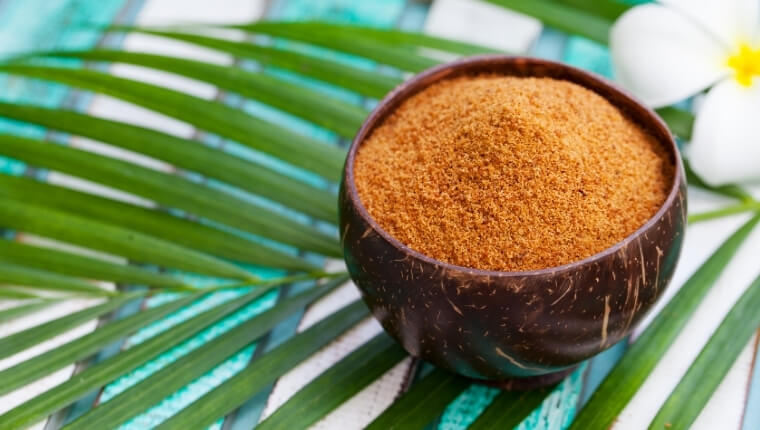
Brown sugar might not be the low-calorie sweetener alternative you were looking for. But adding brown sugar to coffee certainly has a few gastronomical benefits.
First of all, the molasses in brown sugar is an incredible flavor enhancer. Unlike white sugar which has literally no distinct flavor, molasses has a complex and rich caramel flavor.
It blends beautifully with both drip coffee and espresso. If your Starbucks order always contains a pump of caramel syrup, there’s a very good chance that you will love brown sugar in your coffee.
Now, I personally love my lattes with half a teaspoon of dark brown sugar. But if you are a coffee snob who wants to taste the true flavor of the beans, brown sugar won’t likely be your thing.
You could feel that the dark caramel overtones of brown sugar are rather masking the original flavor of coffee instead of elevating it.
However, since I don’t personally know about the mysterious workings of your taste buds, you should try it once before straight-up discarding the idea.
Apart from influencing the taste, brown sugar also deepens the color of the brew. If you take your coffee with milk, adding brown sugar to your coffee will give you a richer brown color.
Is Brown Sugar Healthy In Coffee?
Brown sugar contains a couple of minerals like potassium, iron, magnesium, and calcium [source]. Granted, they are good for our health. But these minerals are present in very tiny amounts.
Therefore, if you have recently started watching your calories and wondering if brown sugar would be a healthy sweetener option, the answer is no.
What Are the Different Types of Brown Sugar?
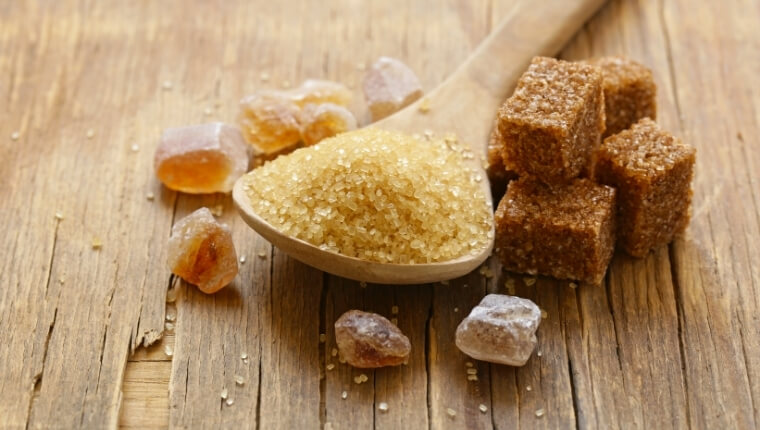
There are two types of brown sugar, namely light brown sugar and dark brown sugar. If you have ever baked, you are already familiar with these two variants. Those who aren’t – allow me to explain the difference.
Dark brown sugar contains almost twice as much molasses as light brown sugar. Hence, the former has a darker amber color and richer caramel flavor.
Now, which one you should add to your coffee boils down to personal taste. If you prefer the toffee-like flavor of molasses, try dark brown sugar. But if want a more balanced brew, I’d suggest light brown sugar.
Brown or Raw Sugar?- Which One Is Better for Coffee?
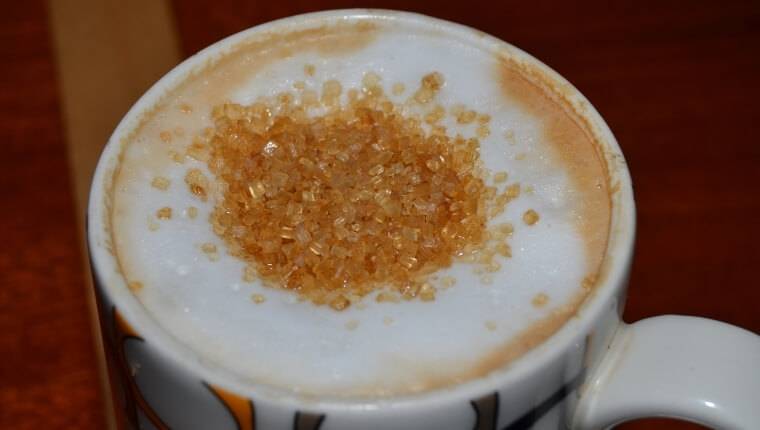
Also known as raw cane sugar and demerara sugar – the trend of adding raw sugar in coffee is rapidly catching on. Again, to my utter dismay, raw sugar isn’t a healthier alternative to white or brown sugar. All three sugars are nutritionally identical.
Brown sugar is just refined white sugar with added molasses. Raw sugar, on the other hand, is the stage before the final refining process. Simply put, raw sugar is slightly less refined than white/brown sugar.
Molasses is naturally present in raw cane sugar in very small amounts, giving it a light golden color and mild caramel taste.
To accurately describe its taste, I’d say it’s more caramel-y than white sugar but less than light brown sugar. Hope I’m making sense here.
If the idea of heavily modifying the taste of coffee with brown sugar won’t fly with you, raw sugar could be a suitable option for you.
What Type of Sugar Is Best for Coffee?
People have been sweetening their coffee since forever. I won’t use nutritional value as a parameter here because all sugars are nutritionally similar.
To find out the best sugar option for your coffee, we will talk about how each sugar impacts the flavor of the coffee.
White Sugar
Among all the sugar variants, white table sugar is the most widely used one in coffee and tea. Partly because it’s cheap and easily available, partly because it has no additional flavor.
Stick to good ol’ white sugar if you prefer just a slight hint of sweetness to balance out the natural bitterness of coffee.
Brown Sugar
Brown sugar should be a go-to choice for cafe caramel aficionados. I should note that brown sugar also makes the brew taste a bit heavy. Some people love it, some don’t. The only way to tell for sure is to give it a taste. So go ahead and try.
Thanks to the availability of light brown and dark brown sugar, you can easily customize your cup of java right according to your taste.
Raw Sugar
The small amount of molasses naturally present in raw sugar will only add a caramel undertone to your brew. It’s neither as intense as brown sugar nor as plain as white sugar.
So for those who want a little of both can opt for raw cane sugar.
Raw sugar goes by many names such as demerara sugar, muscovado sugar, turbinado sugar. So the next time you see these names printed on sugar packets in a cafe, you would know what to do.
Flavored Sugars
The latest trend to join the bandwagon is flavored sugar. The flavor can be practically anything you can think of. The most popular flavored sugar variants for coffee are vanilla and coffee-infused sugar.
Most manufacturers use extracts to infuse with sugar. Certain gourmet brands dump split vanilla pods or freshly roasted coffee grounds in the sugar in a sealed container. I believe it’s a better way to infuse the flavor and aroma with sugar.
Sure, the idea sounds good on paper and according to a lot of millennials and Gen-Zers, it makes coffee tastes fab. If you want to get adventurous and try something new, be my guest.
The flavor options are endless, so you can experiment with as many flavors as you want till you find what works out for you.
Flavored sugar has a great potential to make blended coffee beverages like frappe even better. However, if you take your coffee black, it’s probably best to stick to white, brown, or raw sugar.
What Happens If You Add Coffee and Sugar Together?
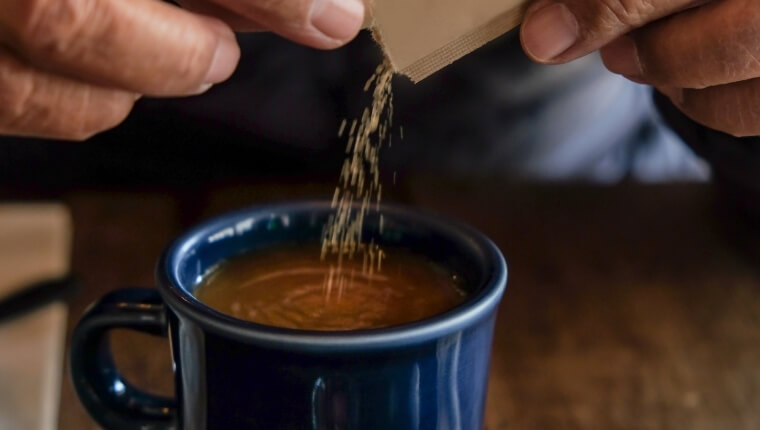
Like it or not, sugar does drown out some of the subtle notes of your brew. I am talking about a seriously good quality coffee here. Premium coffee beans have a natural sweetness to them.
When roasted and brewed properly, the sugar in the beans caramelizes, releasing a hint of sweetness. Those who spend top dollars on A-grade coffee beans and high-end coffee makers can stave off the added sugar.
Having said that, I or no one should be telling you how to take your coffee. If you like your coffee a little on the sweeter side, add sugar, by all means.
Alternatives to Sugar for Your Coffee (How to Sweeten Coffee without Sugar)
If you are adamant about staving off sugar completely and want a truly healthier alternative, you are in for luck.
Here is a quick list of low-calorie white and brown sugar alternatives for coffee:
Stevia

Made from the extract of the Stevia plant, it’s a plant-based sweetener with zero calories. It’s a great option for both diabetic individuals and weight watchers. Some people aren’t a big fan of its bitter aftertaste, though.
Maple Syrup
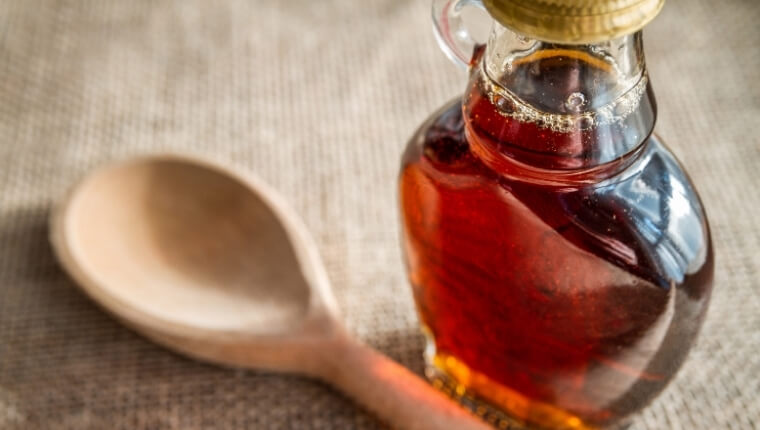
Loaded with minerals and 24 types of antioxidants, maple syrup certainly is a great table sugar alternative. However, it’s still pretty high in sugar. Therefore, you should take it in moderation, especially if you are planning to reduce calorie intake.
Honey

Low on the glycemic index and high on fructose, honey is a tastier and healthier alternative to sugar in coffee. A few spoons a day can keep blood sugar in control and also help you stay in shape.
Raw manuka honey has way more health benefits than regular honey. It’s quite expensive but worth every penny.
Agave
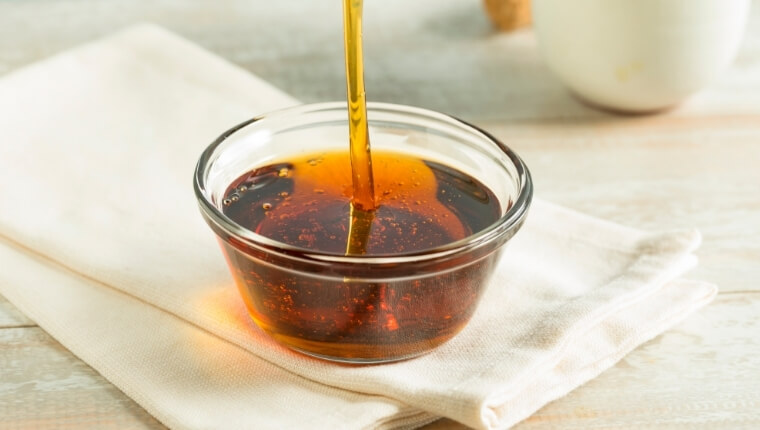
Agave nectar is also a natural sweetener containing fructose. It’s healthier than white sugar only if you use it sparingly. Taste and texture-wise, it’s pretty close to honey, just milder and thinner.
Apart from the above-mentioned sweeteners, some folks also use nutmeg, cinnamon, or vanilla extract to lightly sweeten their brew. Literally, anything is a healthier choice than white sugar.
N.B: I intentionally left out popular artificial sweeteners like saccharin (Sweet’N Low), Acesulfame potassium, Splenda, and Aspartame. Although these are virtually calorie-free, whether they are completely safe or not is still up for debate.
Bonus: Great recipe for Starbucks Brown Sugar Oat Milk Shaken Espresso
Let’s wrap this up
So can you use brown sugar instead of white sugar in coffee? You definitely can!
But whether you should use brown sugar in coffee or not is always up to you.
My job was to give you an idea of how different sweeteners influence the taste of coffee. Hopefully, this guide cleared up all the doubts you had in mind.

